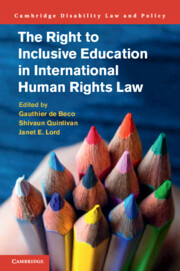Book contents
- The Right to Inclusive Education in International Human Rights Law
- Cambridge Disability Law and Policy Series
- The Right to Inclusive Education in International Human Rights Law
- Copyright page
- Contents
- Notes on Contributors
- Acknowledgements
- Preface by Theresia Degener
- The Arthur Cox Foundation
- 1 Introduction
- Part I Background
- Part II Theoretical Foundations
- Part III Implementation
- A Strategies
- B Mechanisms
- 15 Inclusive Education
- 16 Emerging Trends in the Jurisprudence of the European Court of Human Rights
- 17 Emerging Jurisprudence on Inclusive Education under the European Social Charter (Revised)
- 18 The Scope of Recognition and Protection of the Right to Inclusive Education in the African Human Rights System
- Part IV Practice
- Index
16 - Emerging Trends in the Jurisprudence of the European Court of Human Rights
The Right to Education for Persons with Disabilities
from B - Mechanisms
Published online by Cambridge University Press: 15 April 2019
- The Right to Inclusive Education in International Human Rights Law
- Cambridge Disability Law and Policy Series
- The Right to Inclusive Education in International Human Rights Law
- Copyright page
- Contents
- Notes on Contributors
- Acknowledgements
- Preface by Theresia Degener
- The Arthur Cox Foundation
- 1 Introduction
- Part I Background
- Part II Theoretical Foundations
- Part III Implementation
- A Strategies
- B Mechanisms
- 15 Inclusive Education
- 16 Emerging Trends in the Jurisprudence of the European Court of Human Rights
- 17 Emerging Jurisprudence on Inclusive Education under the European Social Charter (Revised)
- 18 The Scope of Recognition and Protection of the Right to Inclusive Education in the African Human Rights System
- Part IV Practice
- Index
Summary
- Type
- Chapter
- Information
- Publisher: Cambridge University PressPrint publication year: 2019
- 1
- Cited by

